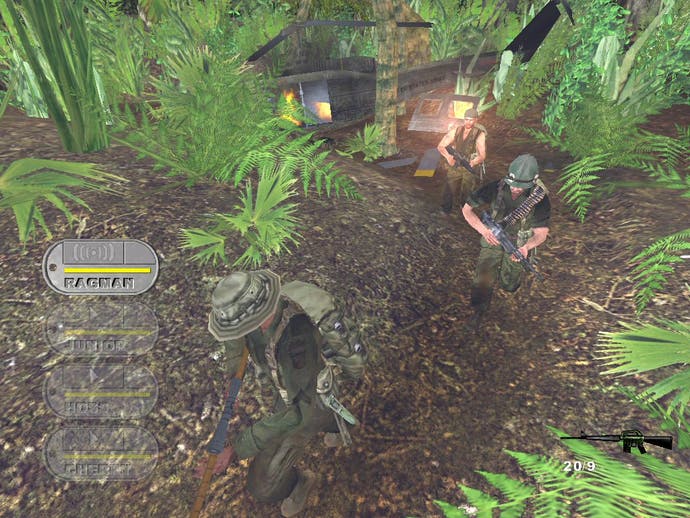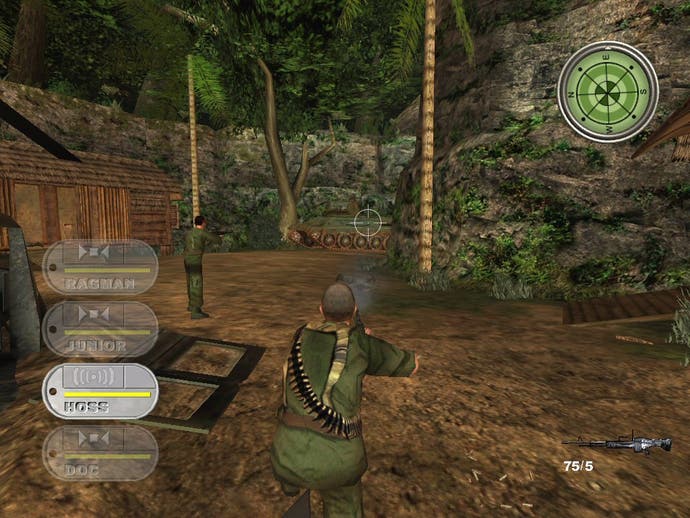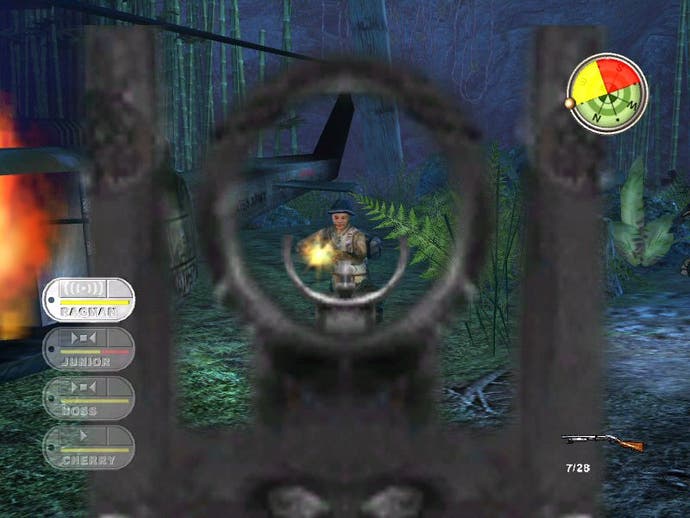Conflict: Vietnam
A Pivotal moment in the history of Vietnam games?
Order yours now from Simply Games.
It's enough to give you a thousand yard stare when you realise how many Vietnam War-based games we've got to lock and load this month. This being the second of four, it follows just a few months after the release of two PC-only Vietnam efforts, and also in the same week as having had a hands-on with two games based on that other games industry obsession - World War II. You honestly couldn't make it up. And as the war-hungry accidental Nam specialist, lover of late '60s rock, and decorated veteran of the two previous Conflict campaigns, your reviewer has been thrust into active service again, despite clear signs of post traumatic stress disorder, numerous shrapnel wounds, and the tendency to play air guitar at inappropriate moments. Blame Hendrix.
So long as you can stop being cynical for a moment at the death of originality in the games industry, shoehorning the Conflict brand into a Vietnam setting does seem like a snug fit in theory. Both Conflict games of the past two years showed huge promise, sporting the kind of slick, instantly intuitive control system that is so good it should be patented and become the standard in all squad-based games. Okay, so Pivotal's efforts were hamstrung somewhat by the less than stellar visuals and, yes, the sequel was essentially more of the same, but as a gameplay formula it ought to translate to practically any war you throw at it.
It's the worst place in the world and they don't even know it

Conflict: Vietnam, in common with its predecessors, follows the fortunes of a four-man squad, with the player able to switch between the uniquely capable soldiers as they see fit (Hidden & Dangerous-style, as opposed to the one man and his AI helpers in Rainbow Six). This time it's four foul-mouthed, sex-starved US grunts - Ragman, Junior, Hoss and Cherry - blazing a trail through the deadly jungle environment during the Tet Offensive of early 1968, after they find themselves cut off from their unit thanks to their chopper being shot down.
But before you get to sample the main meat of the game, you're given a quick refresher course around the base, with basic (and mercifully brief) weapons training as well as a quick run through of how to issue commands. What immediately hits home is how much better the quality of the scenery is this time around, with a pleasingly rich array of non-repetitive environments that are literally a world away from previous Conflict games. Before you get too excited though, Pivotal hasn't quite got there yet, and routinely gives with one hand and takes away with the other. The animation, for example, is graceful, slick and convincing, but the effect is ruined once you see the shockingly awful the PSone era facial detail up close. It instantly drags the game down with it. You wonder how the Bath boys can get so much right, then mess up the whole effect on something as important as how they look.
Set over 14 largely unforgiving missions, it becomes quickly apparent that the tight, narrow jungle environments are incredibly dangerous place to hang out on a Thursday night. If you're not setting off booby traps, you're copping supremely accurate sniper fire, stupendously on target machinegun fire, or, worse, being blown to bits by rockets and grenades. Compared to previous Conflict games, the enemy AI has been tweaked towards the expletive strewn side of challenging, and in heavily camouflaged environments such as this, they're perfect for VCs to camp out in and frustratingly difficult to spot. The name of the game is sticking together, darting from one cover point to another, and hoping that you can spot them before they spot you - or else it's generally curtains.
"I ain't sick. I just want to get laid that's all!"

Although the control of your squad is a piece of cake even in the heat of a battle, tactically Conflict: Vietnam demands a totally different mindset to the previous titles. With most of the action taking place in very confined, narrow corridors, splitting the squad up simply isn't a realistic option, mainly because you're consistently faced with clusters of enemies in fours and fives, and they'll take you out in open cover in literally a couple of seconds. You really do need all hands on deck at every single opportunity, and as soon as that isn't possible, the end of the game inevitably follows.
Most levels wouldn't actually be all that tough to work your way through were it not for the two save games per level system, in addition to that laziest and most hateful bugbear of ours: the infinitely respawning bastard enemies from hell. One particularly nasty section springs (spawns?) to mind on Hill 933, where two machine gun nests spray you with unerring accuracy as enemies repeatedly respawn from both the left and right flank. Flanking left between boulder cover points in a hail of bullets, and no small amount of luck, we made it around the back to the trenches, at which point the enemies just keep on coming. If you can keep your men alive long enough to get beyond this section the respawning nightmare ceases, and normal 'cluster attacks' resume, but, the question is, why on earth do games designers persist in punishing the player with false challenges? Just give us a finite number of enemies, we'll deal with them and move on. If we set up good cover points and they just keep on coming and we end up running out of ammo, where's the fun in that? Not only is it blatantly not fair, it ruins the flow of the game and ends up providing heated frustration. And what happens when the gamer gets inordinately frustrated? They generally give up and do something more fun, like the washing up. No really.
In our experience you eventually pick your way slowly through each level, but not without heavy resistance along the way. If it was the kind of fair challenge that actually tested the player's ability that would be fine. Killzone, for example, holds the player up endlessly, but the difference is you're fighting the same five aggressors; in Conflict: Vietnam the enemy go down easily enough, but the sheer weight of numbers and their incredible accuracy will more often than not count against you. It feels like in the absence of any truly cunning AI routines, Pivotal took the other route and stacked the odds against you with the weight of numbers instead. But, like we said; weight of numbers isn't really the issue here, it's the respawning AI factor. It's cheap, unfair, and has no place in a modern videogame. Be gone, foul gaming mechanic.
Are You Experienced?

At least Pivotal has listened to a few of the long term moans: you can finally pick up enemy weapons and ammo, as opposed to the previous Conflict games forcing you to seek out ammo caches. They're still there in Vietnam, but it's a major bonus being able to snatch enemy weapons too. Another nice touch is the ability to assign skill points earned throughout the missions as you see fit, giving the game a pleasing RPG-style upgrade touch that goes a long way to giving you a squad that you actually care about and will keep alive at all costs. It's a system that other similar games such as Rainbow Six, Ghost Recon and Hidden & Dangerous could all benefit from, and it's nice to see, also, that your weapons inventory spans several missions, meaning an irresponsible approach early on could well be punished later. Although, having said that, you'll probably be doubly annoyed when this along with everything else starts to count against you.
In terms of its atmosphere, Conflict: Vietnam can't really hold a candle to the likes of Vietcong or even Shellshock. The FMV, while a cut above previous Conflict games, is still far too amateurish to make a lasting impression. It's great to - initially - hear that SCi has managed to license some late 60s classics to accompany your start to the game (notably The Rolling Stones' Paint It Black - how much of the budget did that eat up?), and the general incidental audio is well up to scratch, but the scratchy voiceovers sound like they're coming out of a walkie talkie, and the script tries almost too hard to create a US-soldier with 'additood' feel, with endless mo-fo swearing and testosterone-fuelled smack talk getting on our nerves almost immediately.
Despite the questionable decision to design a corridor shooter in the jungle (largely a consequence of the engine's limitations) it still feels very much in keeping with the other Conflict games. The chances are, if you particularly got off on the Desert Storm titles, you'll immediately slip into Vietnam with no problems at all. The major difference, aside from the scenery, is it's just a touch harder. Spotting pin-sized enemies in a jungle environment is a bit of a lottery, simple as that. You might stand more chance of locating them via their muzzle flash or their bullets, and while that might well be all part and parcel of jungle warfare, the reality is that there have been better Vietnam games, and CV doesn't even feel like it has a capable enough engine to really work around the design restrictions that scream out at you.
Jungle Fever
Ultimately Conflict: Vietnam is by no means as bad as some people are making out, but nor is it delivering on the promise of the previous games either. Co-op online play may well have rescued its long-term appeal as has been the case with Rainbow Six 3, Black Arrow and Island Thunder, but with only split screen to service your multiplayer needs, all you're left with is a solid, unspectacular single-player campaign that frustrates more than it entertains.

